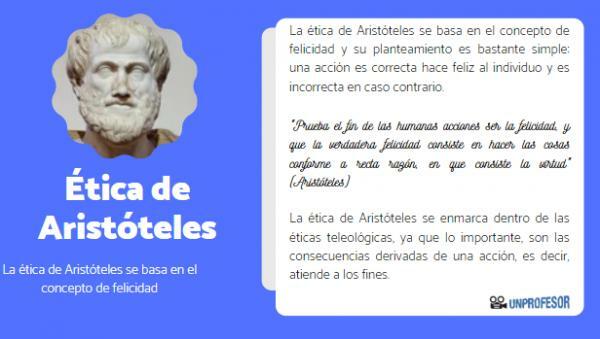Aristotle's ethics

Aristotle's ethics is based on the concept of happiness. Aristotle's approach is quite simple, an action is correct if it makes me happy and it is wrong if it does not make me happy. Aristotle's thought says that the consequence of an action generates happiness or not. The individual perception of this action is analyzed. What if I do something that makes me happy and that is bad for society? Aristotle says that the consequence of that act will be that you will be arrested and therefore, in the end, unhappy.
According to Aristotle, the differential capacity that makes us happy is the intellectual capacity, this is what will bring us closer to happiness. In this lesson from a PROFESSOR we are going to study what Aristotle's ethics consists of with a video, summary notes and exercises with solutions for you to test your knowledge. Class begins!
Index
- Happiness, principle of Aristotle's ethics
- Teleological ethics and deontological ethics
- Aristotelian voluntaryism VS Socratic moral intellectualism
- Types of virtues in Aristotle
Happiness, the principle of Aristotle's ethics.
We offer you a brief exposition of Aristotle's ethics (Estagira, 384 a. C.-Chalcis, 322 a. C.) philosopher and scientist, learned in many branches, and disciple of Plato. His thought has been of great influence in the history of Western philosophy, and many of his ideas are still valid today. He was a very prolific writer, although only 31 of his 200 works remain.
Aristotle he didn't think like he did Plato, in the existence of two worlds. For him, there was only one, this one, where beings composed of matter (body) and form (soul) live, and whose purpose is to happiness. Furthermore, these beings aspire to knowledge. And knowledge, precisely, which is only accessed through the experience, of the reason, the happiness of the individual will come, who can only become so in society.
So that, the Aristotle's ethics is based on the concept of happiness and his approach is quite simple: an action that is correct makes the individual happy and is incorrect otherwise.
It is a eudaemonic ethics because to determine if a action is good or bad, it only looks at whether it produces happiness or not. Now, what happens if a person does something that makes him happy, like stealing, and with that action he is making society unhappy? Aristotle's answer is clear. If you steal, you will be punished, you will suffer the consequences, you will be arrested and you will go to jail. Therefore, under these conditions, that person could not be happy. Stealing can never bring happiness, nor can any other action that harms society as a whole.
It proves the end of human actions to be happiness, and that true happiness consists in doing things according to right reason, in which virtue consists.
The ethics of Aristotle is framed within the ethicss teleologicals, since what is important are the consequences derived from an action, that is, it serves the ends.
Teleological ethics and deontological ethics.
Within ethics, two different points of view can be distinguished, which gives rise to two types of ethics: teleological ethics and deontological ethics.
1. Teleological ethics
This type of ethics attends, to determine whether an action is correct or incorrect, at the consequences derived from such action. For Aristotle, actions are correct if they provide happiness and incorrect actions that do not provide it. Therefore, happiness would be the end of all action and the pursuit of happiness, the purpose of all human life.
2. Deontological ethics
It's about ethics formal, where the important thing is the action itself, and not the result of it. This is the kind of ethics advocated by Kant. Only the action is what determines the goodness or badness of the act. According to this philosopher, lying, for example, is always bad, even if with your truth a loved one is arrested, or suffers any misfortune.
Teleological ethics are ethics of purposes and the deontological, of beginning.
Aristotelian voluntaryism VS Socratic moral intellectualism.
Remember that for Socrates, to act well, it is only necessary know good, and if someone acts badly, it is simply out of ignorance, ignorance of what good is. A rather optimistic idea, because in fact, experience shows that this is not the case. Everyone, or almost everyone, knows how to differentiate good from bad actions and yet they do wrong. So, Aristotle going to add something else.
To do good, says the stagirite, it is not enough to have knowledge of the good, but you also have to want to do it. Aristotle identifies the good with the happiness, and it is the end of the human being being him, the only one who can determine if he is happy or not. Only the agent can do it. Virtue is in the habitThe good must be practiced, and this will undoubtedly lead to happiness. Because the realm of happiness is reason, reflection, philosophizing, and this must become the objective of human beings.

Types of virtues in Aristotle.
Aristotle defines virtue as excellence or earring, and this is in the soul, which gives life to bodies and their object, is the happiness. Aristotle distinguishes two types of virtues:
1. Ethical or moral virtue
They are acquired through habit and custom and is in charge of dominating the sensitive or irrational part of the soul and regulating relationships between individuals. For Aristotle, moral virtue is the right balance between two extremes. For example, bravery is the middle ground between cowardice and recklessness.
2. The dianoetic or intellectual virtue
It is the virtue of the intellect (nous) or thought (noesis), and are learned through education or teaching, having their origin in the dianoia, what is the part rational of the soul. These virtues are the understanding, science, wisdom, art and the prudence.

If you want to read more articles similar to Aristotle's ethics, we recommend that you enter our category of Philosophy.


